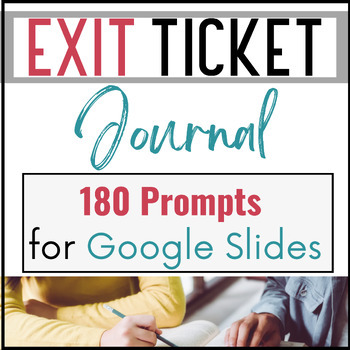Exit Ticket Journal on Google Slides-- 180 Prompts for the ENTIRE SCHOOL YEAR!!
- Google Slides™

What educators are saying
Description
This digital journal on Google Slides enables students to reflect back on classroom lessons either in class or at home through distance learning. There are over 70 original prompts included in this bundle as well as free choice options that encourage students to reflect on their learning.
These exit tickets are appropriate for any secondary content area in grades 6-12.
To use this Exit Ticket Journal, each prompt is numbered 1-180 so that you can assign a specific number of prompts to your students at a time. For example, you can assign prompts 1-5 due by the end of a specific week or by a specific date.
Alternatively, you can log in and check students' exit tickets at random to keep them on their toes. Students can also access these prompts at the end of a class period to answer at the end of a lesson. You can also use these prompts as entry tickets.
There are lots of ways to use these prompts, and exit tickets are beneficial because:
- They provide teachers with an informal measure of how well students have understood a topic or lesson.
- They help students reflect on what they have learned.
- They allow students to express what or how they are thinking about new information.
- They teach students to think critically.
- They help students develop a growth mindset.
PERKS FOR YOU:
*Join the Bespoke ELA Blog to gain access to 100+ FREE resources that are not here on TpT!
* Be sure to click the "FOLLOW" button that is located next to my picture in the profile so that you can hear about sales, new products, and freebies!
* Don't forget to leave feedback to EARN POINTS that turn into cash towards future purchases!
=======================================================
You might also like:
30 MENTOR SENTENCES for Literary & Rhetorical Devices with Writing Application
Poetry Bundle: 20 Short Poems to Teach Rhetorical Relationships & Explication
Macbeth Bundle: Supplementary Materials for Any Macbeth Unit
25 Essential Handouts for Writing Workshop
Crafting Commentary for Literary Analysis
Nonfiction: Tone and Bias in the Media Coverage of Jack the Ripper
MEGA Beowulf Bundle: 25 lessons and activities/ 108 pages/ ANSWER KEYS!
=============================
Follow ME for UPDATES, ANNOUNCEMENTS, & FREEBIES!





